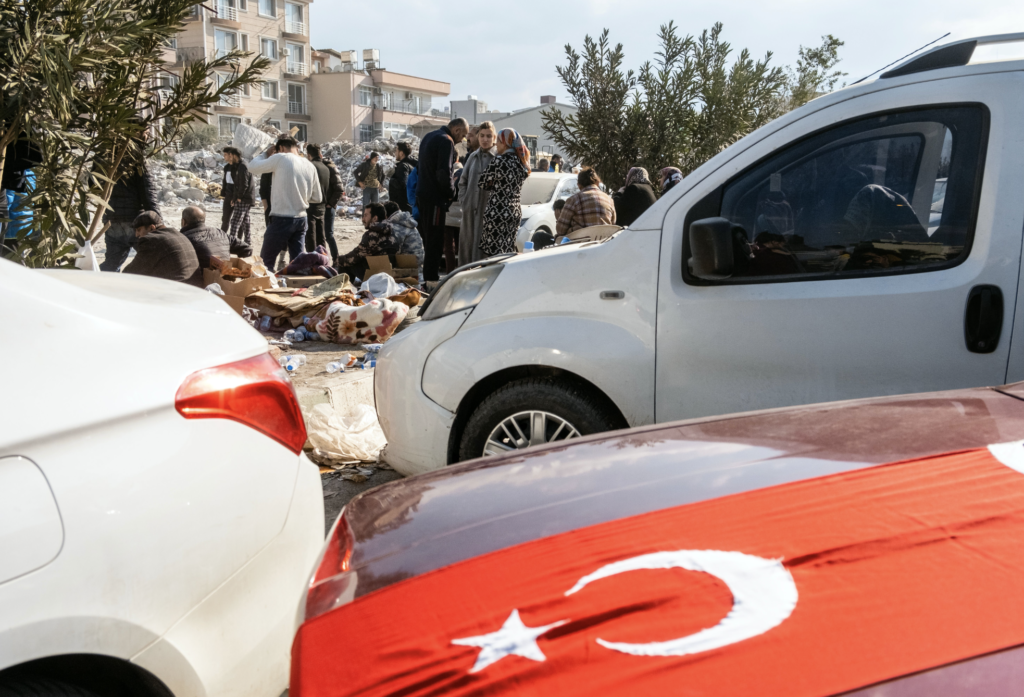By the Missouri and Texas Disaster Relief Water Purification Teams in Turkey
It is difficult to describe what we are seeing.
As with many natural disasters, everyday life goes on for most people in the country. The city in which we are based is outside the earthquake zone and we travel daily into different cities that have suffered great loss. Since our base city experienced little damage, lifeinside the city goes on as normal.
But this normalcy comes at a price.
Three years ago, a 6.7 magnitude earthquake hit this city and brought down a significant number of its weakest buildings, killing and injuring many civilians. In the quakes that hit on February 6th, a few more buildings collapsed.
Yesterday, we drove three hours into one of the hardest hit areas to install a water filtration system at a local community center. Along the route, we saw multiple buildings that had totally buckled or were leaning at odd angles. We were graciously received by the people gathered at a tent city set up next to the community center and, even with the language barrier, were welcomed cheerfully.
We met with the local site coordinator and began to assess the situation and their needs. Water pipes had frozen and cracked inside the building, so unsafe, unfiltered water was being used for food preparation and drinking.
Our team’s water system specialist followed our hosts around the site and assessed what we could do. While he and another team member worked on installing a multiple-stage water filtration and purification system for the entire building, other members of our team entered the tent city to greet families who had lost everything.
While our team translator helped with the water system installation, our volunteers inside the tent city found that many smiles and nods, Google translate allowed communication to take place. Residents of the tent city were elated to hear that we were installing the filter system for clean water.
One of our team members knelt down and began to thumb wrestle with the children gathered around. At first they were shy, but within a few minutes, squeals of laughter were heard across the yard, even by those working in the basement of the community center!
Our water specialist had to dig deep into his collection of parts to find fittings that could connect our American filters to Turkish pipes, but a small group of local men gathered around and shared their thoughts on how to proceed.
One local curtain maker jumped right in to help. It soon became obvious that he was quite the handyman (he loved Teflon tape), so he and one other local were trained in how the system worked and how to change the filters and backflush when necessary.
Finally, all the connections were made and hose clamps were tightened.After assessing the water with test strips, it showed that the system was working as designed and that the water was now drinkable. Hundreds of locals, including those living in tent cities, now benefit from that clean water source.
Although dusk was fast approaching, we headed to assess another location at a feeding center set up outside a local high school. As we drove across town, we saw blocks and blocks of demolished buildings and excavators working to clear the roads and remove debris.
The temporary kitchen needed a large volume water filtration system, but we weren’t carrying enough part with us to meet their need right then. We made a plan to purchase those parts and complete the work the following week.
Our team of five national volunteers are preparing three meals a day for more than 1,200 people inside this feeding center. Turkish soldiers then distribute these simple meals of soup, rice and meat.
One of the five volunteer cooks is in his twenties’s and has volunteered to serve for three weeks. One of the other cooks lost his home in the earthquake, as well as five dear cousins who died. Two others said that their homes were majorly damaged but thankfully still livable.
These national volunteers asked us to remember that when we take photos of the destruction, these deep piles of debris are temporary tombs for thousands of those who did not make it out of their buildings before they caved in.
On the drive back, our team started combing the internet looking for additional filter systems that met our needs and could be purchased in-country. We found a few options that could work and have made plans to order them soon. .
The following morning, we walked to a couple of local plumbing shops to begin gathering items in demand. While in one shop, the owner willingly engaged in spiritual conversation for well over an hour and important seeds were planted.
Wherever we have gone, we have been greeted by resilient people who are choosing to wake up and face each day, at times with tears and at times, even with smiles.
Published March 3, 2023
